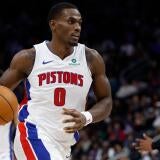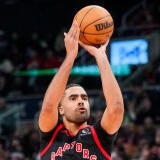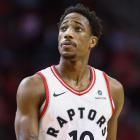There was no good way for Raptors to trade DeMar DeRozan, and five other thoughts around the NBA
Toronto might not have handled the DeRozan trade perfectly, but it couldn't have dealt him without any hurt feelings
DeMar DeRozan sat down with ESPN's Chris Haynes on Tuesday for his first interview since the trade that sent him to the San Antonio Spurs. The former Toronto Raptors star -- at some point, it will stop being strange to put it that way, right? -- expressed his frustration with how the deal went down.
The thing about DeRozan is that he cares. Throughout his tenure with the Raptors, even before he became the type of guy who can win an award for his interaction with the media, he cared about what people said about him and his team. Back when losses were expected in Toronto, they still hurt him.
This is the kind of stuff people would say about DeRozan: "He's a guy that I think loses sleep at night over losing games and loses sleep over what direction we're going. I don't think everybody's like that. I think he's a guy that people don't really understand how important winning is and how much Toronto, the Raptors, mean to him. That's something he's expressed very clearly to the team is that he wants to be successful, he wants to be successful here."
At this point, that kind of quote seems obvious to anyone who has a cursory understanding of DeRozan's career. It was said before DeRozan had even played a playoff game, though, and well before he famously declined to take meetings in free agency and declared, "I am Toronto." (Shout-out to former Raptors sharpshooter Steve Novak for the insight, which I used in an SB Nation story that feels a million years old now.)
Early in his career, DeRozan hated that teams walked into the Air Canada Centre expecting to win. He hated that outsiders, including many of his peers, looked down on the city and the franchise. He hated sitting at home and watching his friends play in the postseason. He was determined to change the way people thought of Toronto, and he worked like crazy to succeed on his own terms.
DeRozan said much of this to Haynes, with the clarity and brevity that comes with having delivered these sorts of answers for years. As the guy with the word "loyalty" tattooed on his left hand, the guy who embraced the place he called "literally a second home" before it was cool, he has been asked about this over and over again. Being a Raptor became part of DeRozan's identity in a way that is unusual in this business. It is unsurprising, then, that he is still in shock.
"I was so mentally in this being my home," DeRozan told Haynes. "I took pride in the community. I took pride in everything when it came to Canada. Not even just Toronto, everything that came with Canada, wearing that Toronto Raptors jersey. That's why it was so tough and emotional for me when I first heard it because everybody knows what type of guy I am."
This is also why, regardless of how you feel about the way Raptors president Masai Ujiri handled the trade, it is hard to imagine any kind of clean separation. DeRozan said all he wanted was more notice that a deal was possible, but how much of a warning would have sufficed? Should Ujiri have risked upsetting him by divulging the discussions when he thought actually landing Kawhi Leonard was a longshot? What, exactly, do franchises owe their franchise players, beyond their hefty salaries? These are difficult questions to answer, but Ujiri's job requires both an ability to connect with people and cutthroat decision-making. In a candid moment at his press conference last week, Ujiri said this is "honestly why I will not be doing this one day."
Based on the fact Ujiri began that presser with an apology, it is fair to say that his communication with DeRozan could have been clearer. Even if DeRozan was completely in the loop, though, I bet he would still be talking to Haynes about having a massive chip on his shoulder and promising that next season is "going to be hell for a lot of people." Toronto built its culture around DeRozan and Kyle Lowry, and the nine-year veteran made no bones about the fact he wanted to finish his career where it started. DeRozan was committed to the Raptors as long as they were committed to winning. It was always going to be brutal to find out that this was not reciprocal.
Ahh, Capela
Losing Trevor Ariza hurt. Losing Luc Mbah a Moute did not help. Adding Carmelo Anthony is, uh, interesting. Still, I'll bet the Houston Rockets remain the second-best team in the league next season, with James Harden and Chris Paul leading the way … as long as they don't mess up the Clint Capela situation.
Capela is by far the best player still available on the free-agent market, and he's stuck in limbo because he's a restricted free agent, no one needs centers and everybody assumed Houston would match any offer sheet. The Rockets have every right to use their leverage here, but there is risk of alienating the 24-year-old to the point where he decides to take the qualifying offer. If he feels disrespected, this next year could be awkward and he can leave as an unrestricted free agent next summer.
I'd be shocked if Houston didn't work something out with Capela, but I'm already somewhat shocked it didn't offer him a maximum contract right away. Capela is a star in his role already, and he may have a much bigger role in a few years. Even if he never becomes an All-NBA player, he is already the type of guy who makes the game easier for elite players without taking anything off the table. The Rockets need him.
Love, actually
I can't wait to see the real Kevin Love again. While my thoughts on his extension are kind of complicated, all of the skepticism I have is about the Cleveland Cavaliers' long-term rebuilding plan. From an entertainment perspective, my take is simple: This makes the Cavs watchable.
Cleveland will likely be one of the worst defensive teams in the league next season, but I am choosing to be optimistic and focus on the other end for now. Over the past four years, whether David Blatt or Tyronn Lue was in charge, there were continual calls for Love to be featured more in the offense. Why not let him facilitate from the top of the key? Why not run him off screens? Why not give him more touches just to diversify the Cavs' attack? All of that is over, as Love will now clearly be Cleveland's No. 1 option. Let's see what that looks like for the first time since 2014, when this dude averaged 26.1 points, 12.5 rebounds and 4.4 assists.
A new kind of Bully ball
Between Zach LaVine coming back on an enormous deal and Jabari Parker coming home as a high-priced rental, the Chicago Bulls are not exactly prioritizing defense. Nearly a week later, I still can't get over Parker essentially saying that defense doesn't matter. Why haven't they re-signed David Nwaba?
I am even higher than most on on Wendell Carter Jr., and I still can't get excited about what's happening here. It's just stunning that the same team took chances on LaVine and Parker, who both have massive defensive deficiencies and have already sustained serious knee injuries early in their respective careers. We should all be rooting for them to get buckets and round out their games, but right now it looks like Chicago is pulling off a stealthy tank job.
Not the Beas
Of course the Los Angeles Lakers signed Michael Beasley, and of course Beasley thinks it's unfair that people judge people like him and Lance Stephenson. Even if you completely ignore the locker-room circus angle, though, it's easy to bag on the Lakers' recent moves from a pure basketball perspective.
"You're talking about taking the ball out of the hands of the most efficient and best decision-maker in the NBA," former Cavs general manager David Griffin said on KNBR 680 recently. "And when you space the court around him, your points per possession is going to be infinitely higher with him on the handle than it is with anybody else."
Griffin said he didn't understand Los Angeles' moves in a playoff context, which, well, me neither. James might be able to make these players better, but these are not the types of guys who make James better. Again, the formula should be fairly simple: surround James with players who can stretch the floor and guard multiple positions. No one is saying that the Lakers shouldn't have any additional playmaking, but going all-in on ball-dominant guys at the expense of spacing and versatility seems crazy.
Poeltl Power
Jakob Poeltl's inclusion in the Raptors-Spurs trade reminds me so much of Domantas Sabonis' place in the Thunder-Pacers blockbuster last year. Like Sabonis, Poeltl is a skilled and smart big man who was stuck in a logjam with his first team and could be a core part of his new team's future. Toronto earned praise for only surrendering its fifth-best young player in the deal, but that says more about the Raptors' collection of talent than it does about Poeltl. If he can add strength without sacrificing his mobility, he will be extremely tough to deal with -- he already has the size, touch and feel for the game that San Antonio loves in its big men.
Sabonis quickly established himself in Indiana last season. Poeltl might not be getting a ton of headlines right now, but don't be surprised if he does the same with the Spurs.


















